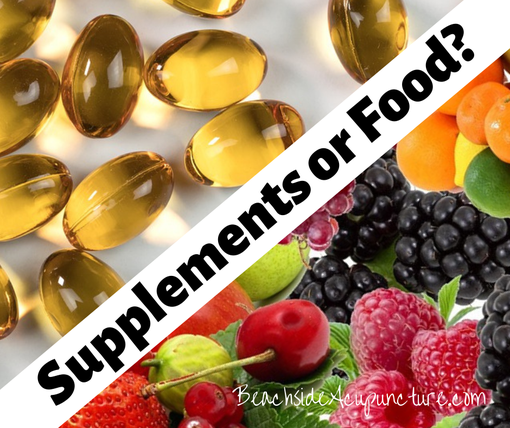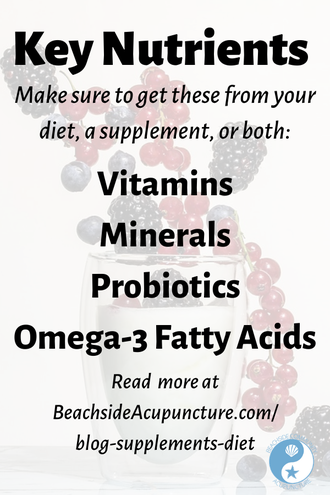
This post contains affiliate links, meaning Beachside Community Acupuncture PLLC may receive a small commission for purchases made through certain links at no additional cost to you. (In other words, you support us in a small way when you buy the products that we highly recommend and would use ourselves!) Click here to view our full disclosure policy.
Nutrition should be simple but is often confusing. There are a myriad of vitamins, minerals, enzymes, antioxidants, bacteria, fats, proteins, and more that have been discovered by well-meaning scientists while they investigated how the body operates. It can be very difficult to keep track of all of them and know exactly what you should be taking, if you even need to take anything at all! Let's look at two views on this topic before discussing the advice that we usually give to our patients.
Food
Some health purists say that a nutritionally balanced diet should eliminate the need for taking supplements, and to some extent that is true. Humans survived for most of their history without needing to take tablets or pills, and many holistic health practitioners believe that the body best assimilates nutrients in their natural state, meaning how they are found in food. Supplements often contain an isolated form of a substance that was synthetically created, and the body may not recognize these isolates because they are not found in nature. If that's the case, you're paying money for health products that might not actually be giving you what you need! Eating a varied diet of all the colors of the rainbow, buying locally grown organic produce and meat, and actively incorporating different types of foods - i.e. fermented food for probiotics and seafood for omega-3 fatty acids - can help you cover most of your nutritional bases.
Supplements
On the opposite end, proponents of supplements argue that the state of our food supply necessitates supplementation, and that sometimes nutritional balances are too great for food alone, i.e. if someone has extreme iron-deficiency anemia, it may be difficult for her to consume enough iron-rich foods to bring her levels back to normal. Even the healthiest of health nuts often have gaps in their diets, and our food can be deficient in the nutrients it usually provides due to poor soil conditions, long travel times from farms to stores, and other factors. Many people opt for highly processed food due to convenience and cost and are therefore eating things that provide empty calories but minimal nutrition. Supplements can be the source of vitamins, minerals, and more when diet is lacking.

The Best of Both Worlds
At our clinic, we teach our patients to become self-aware, listening to their bodies and understanding what they need to do (or not do) to help them overcome health obstacles. We ALWAYS advocate eating a balanced, "clean" diet but recommend supplements when it seems like a patient's food choices won't be enough. In particular, we think everyone should be mindful of:
- Vitamins. A high-quality multivitamin can provide a safety net in case diet falls short, and there's little risk of reaching the upper limit (the quantity of certain vitamins at which they becomes toxic to the body) if a multivitamin is food-based. Read the ingredient label on yours: Do you see foods that you recognize, or just chemical-sounding names like alpha tocopherol and cholecalciferol? The ingredient label of a food-based supplement will read like one from a natural food product.
- Minerals. Multivitamins usually contain minerals as well, but a multi-mineral supplement may be helpful if you know you need even more support. However, our favorite way to get more minerals isn't a pill, but rather to drink local spring water. Look at the labels of various water bottles and you'll see the mineral content listed.
- Probiotics. Americans generally do not consume many probiotics regularly, but adding any fermented food or beverage to your diet can fix that. If you know you need more help with balancing gut flora - i.e. if you've taken antibiotics recently or have known gastrointestinal issues - then a probiotic supplement is probably a good choice.
- Omega-3 fatty acids. Eating fish, chia seeds, walnuts, etc. on a regular basis should provide you with all of the omega-3 fatty acids you need, but many people do not get enough of these nutrients from diet and should therefore take a supplement like fish oil.
We choose to stock Standard Process because of their dedication to purity and often recommend Garden of Life regularly as well, but food-based supplements have been given so much attention lately that you can easily find other options near you. Aim to collect all of your nutrients from food as much as possible...but know that supplements are there for you if you need extra support.

Kathleen Ketola is a Licensed Acupuncturist and the owner of Beachside Community Acupuncture. She loves providing affordable acupuncture to the residents of McKinney, Texas, and surrounding cities like Prosper, Frisco, and Plano, but she also enjoys educating the general public on how acupuncture and Traditional Chinese Medicine (TCM) can treat everything from pain to infertility to stress and beyond. Click "Book Now" at the top of this page to book an appointment or feel free to contact her at (214) 417-2260.










Write a comment